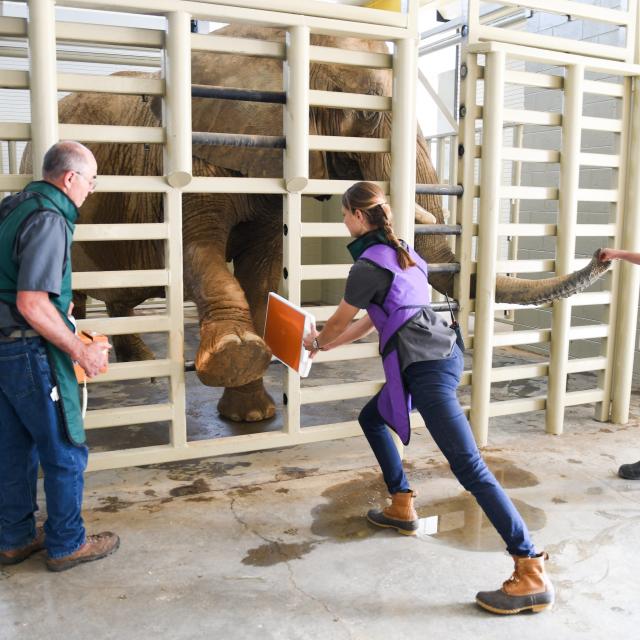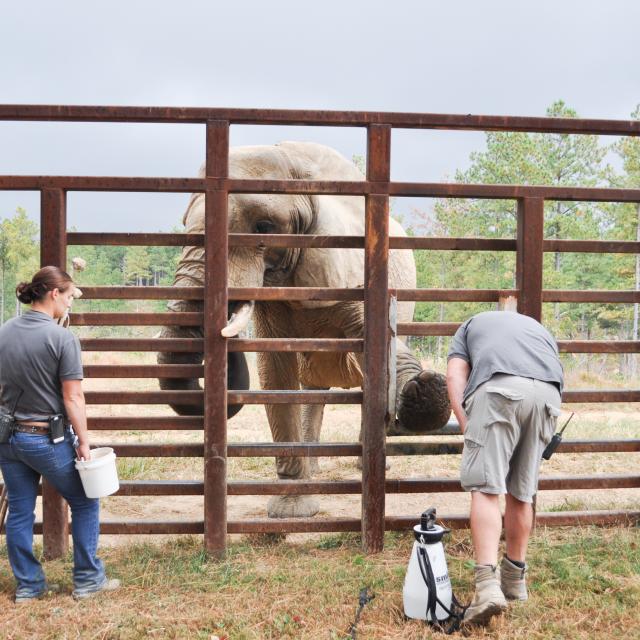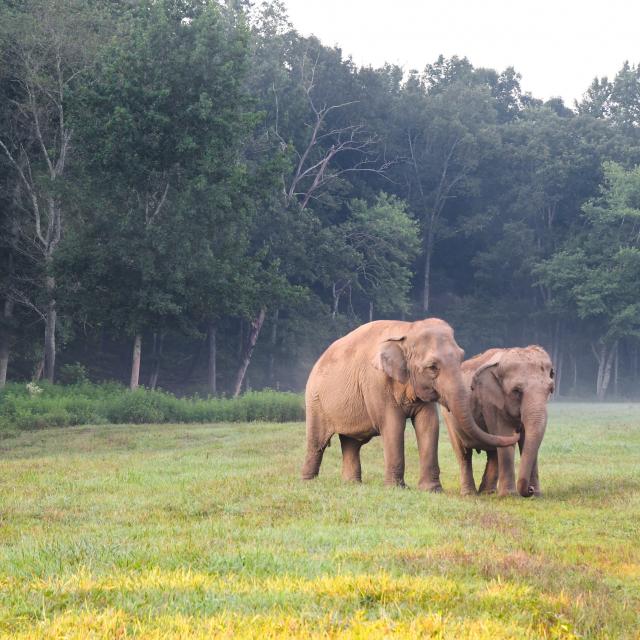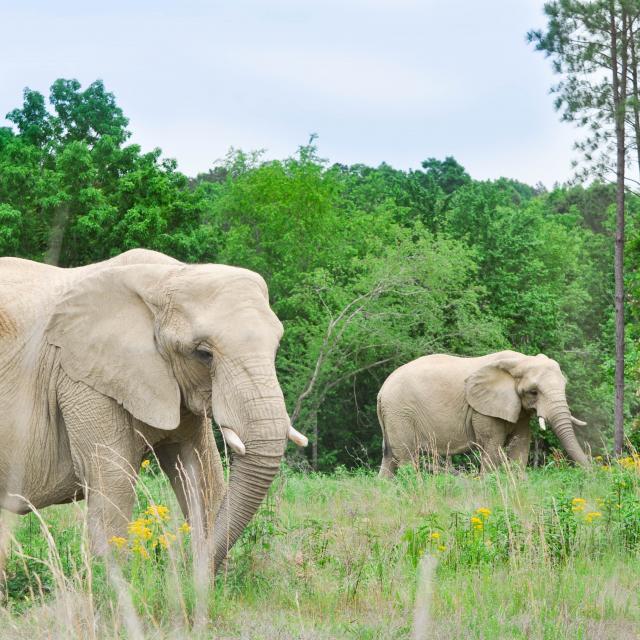Elephant Care & Facilities
In the heart of Hohenwald, TN
Founded in 1995, The Elephant Sanctuary in Tennessee is the nation’s largest natural habitat preserve developed specifically for the needs of Asian and African elephants. Spanning 3,060 acres, it is located in Hohenwald, Tennessee, approximately 85 miles southwest of Nashville. The Sanctuary is currently home to 13 elephants.
Today at The Elephant Sanctuary, the elephants have access to spacious, diverse habitats and social opportunities with other elephants. The elephants are managed in a Protected Contact (PC) system using positive reinforcement and receive individualized veterinary and husbandry care, environmental enrichment, and choice and control over their environment.
The Elephant Sanctuary maintains multiple habitats with heated barns, solar water pumps, spring-fed lakes, pastures, woodlands, and miles of internal elephant proof fencing. The Elephant Sanctuary uses energy-efficient materials to reduce ongoing costs and enhance sustainability. Secure fencing, sound structures, onsite security staff housing, and dependable machinery are absolute necessities for The Sanctuary, ensuring safety for both elephants and people.
The elephants' habitats are closed to the public.
Whole Elephant Care
Optimal care for the health, social and psychological well-being of each elephant is primary at The Elephant Sanctuary.
A team comprised of the Senior Manager of Elephant Care, Training Manager, Bull Care Manager, Barn Leads, and full-time Caregivers working closely with the Director of Veterinary Care, Associate Director of Elephant Health and Wellness, and Registered Veterinary Technician continually evaluates health and well-being, assuring a Whole Elephant Care approach to meeting the elephants’ individual needs.
The Elephant Sanctuary Care Staff undergo extensive training on elephant behavior, husbandry, and all aspects needed to properly care for elephants as a species and to best meet the specific and individual needs of the elephants in their care.
Currently both African and Asian elephants are permanent residents, living in multiple different habitat areas on this 3,060-acre preserve of forest, ponds, and pasture in southwest Middle Tennessee. With the opportunity to roam, socialize, and browse throughout the day, the elephants move at their own preferred pace with companions of their choosing, helping to maintain physical health and psychological well-being.
New elephants coming to The Sanctuary may be housed separately and not introduced to other elephants until their health status is fully assessed and an individualized care plan has been developed by Care Staff.
To meet the daily needs of elephants in care, The Sanctuary provides:
- Expansive, diverse habitats, and opportunity for choice and control of use of environment
- Heated barns for seasonal changes
- Food, including browse, hay, fruits, vegetables, Mazuri, grains, and fresh produce
- Supplements to address deficiencies and health issues common to aging elephants
- Ongoing husbandry care and medical treatment including foot care, dental care, weight monitoring, routine annual testing, radiographic monitoring of chronic illnesses such as osteoarthritis, laser therapy, and pain medication
At The Sanctuary, a separate habitat with barns has been specifically established for the management, care, and enrichment of elephants with known exposure to tuberculosis. This facility has a separate entrance and separate staff.
Protected Contact (PC) Management
All elephants at The Elephant Sanctuary are managed in a Protected Contact (PC) system.
The Sanctuary defines Protected Contact as: a system for managing elephants that uses positive reinforcement training as the primary method to modify behavior; the use of physical punishment is prohibited. Directing the positioning and movement of the elephant is achieved through the use of targets, bridges, and food rewards. Safety is achieved by elephant and Caregiver positioning relative to each other and to a barrier, which typically separates human and animal spaces.
In the PC system, Caregivers function outside the elephant social hierarchy and do not attempt to establish a position of social dominance. If an elephant chooses not to cooperate, at no time is physical punishment used to achieve compliance. Elephants choose whether or not they wish to cooperate with Caregivers. A fundamental aspect of The Elephant Sanctuary is the belief that elephants benefit from having the freedom to make choices about decisions that affect them. For example, choosing to socialize with other elephants or to participate in their health care, deciding when and where to graze, and determining when to submerge in a pond or enter the woods are all seemingly simple decisions but are vital to the well-being of the individual elephant.





Behavioral Management
Behavioral assessment and management are important components of Whole Elephant Care at The Elephant Sanctuary.
The Sanctuary defines Behavioral Management as a proactive approach to managing animals in human care, aimed at encouraging the highest level of well-being. Providing diverse environmental enrichment and positive reinforcement training are two fundamental techniques. Consideration is given to operational procedures and facility issues that may impact behavior, and these are modified when necessary. Approaches are continually assessed and measured to determine if behavioral goals have been met and if methods for managing behaviors have been successful. A behavioral management approach has tremendous potential to directly and positively affect changes towards each elephant’s enhanced well-being.
EleCam
We use a system of solar-powered cameras to locate and monitor the elephants and to offer you, our friends and supporters, frequent glimpses of the elephants we are so fortunate to have in our care.
Watch Now